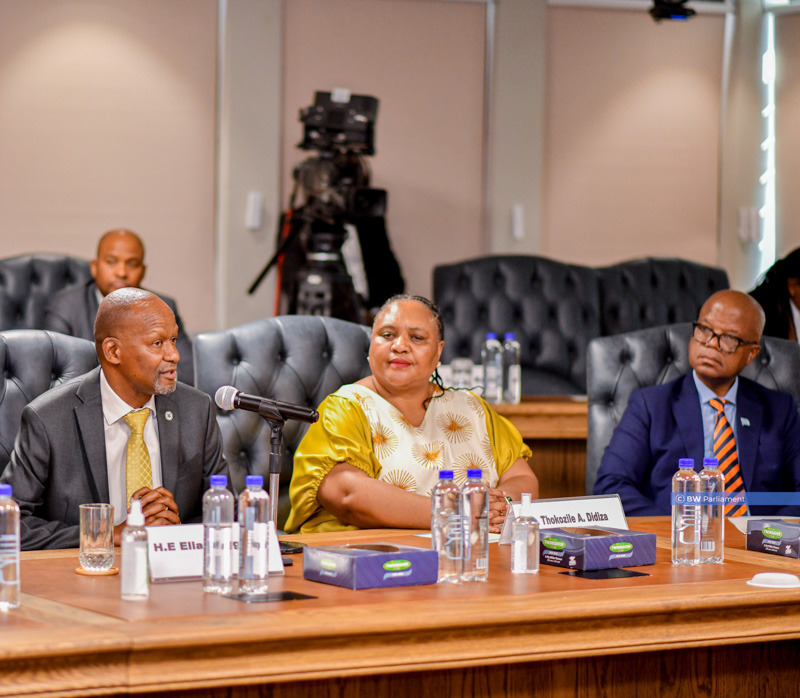Southern African Development Community (SADC) executive secretary Elias Magosi has praised Botswana’s signing of an agreement to create a regional parliament, while stressing the need for faster ratification by member states.
Botswana president Duma Boko signed the agreement in Gaborone last Wednesday.
Magosi, in delivering a vote of thanks after the signing, called it a “momentous occasion” and a critical step towards regional integration, accountability, and enhanced governance.
He commended the leadership of Boko, the Botswana government, and all those who have worked over the years to reach this milestone.
“We did not despair,” Magosi said.
“There have been layers of leaders that have come before you to lay the foundation, and here we are now with you signing this important instrument. We must commend the country and the previous leaders, but we must commend you that you came in a short space of time, and you found it very, very important to add the signature.”
Magosi said the establishment of a regional parliament is not just symbolic, but a necessary evolution in the SADC’s institutional development, especially for enhancing democratic governance, oversight, and the harmonisation of laws across member states.
“It is there to make sure it enhances governance of our region such that we also perform effectively,” he said.
“The laws that are there need an independent voice, an independent eye that makes sure the region and the respective member states follow laws in the manner that serves our region, our member states and our citizens.”
However, the executive secretary expressed deep concern over the longstanding disconnect between presidential signatures at the SADC Summit and the slow pace of ratification by member states’ parliaments – delays that have plagued several regional instruments for up to 20 years.
“One of the goals that I have in this role is to make sure member states sign these instruments that have been with us for quite some time,” Magosi said.
“When we approve the agreement, there is a gap between the signature of their excellencies at the SADC Summit and the ratification signatures. It often takes between five and 20 years, and we wonder what the cause of this delay is.”
He said the delay is particularly alarming, given that all necessary internal reviews by legal departments and ministries are assumed to be completed before presidential sign-off, and therefore ratification should proceed without unnecessary bureaucratic hurdles.
“The SADC is only as strong as its instruments. The SADC is as effective as the effectiveness of such instruments. And for those instruments to come into effect, they must be signed, they must be ratified,” he said.
Magosi issued a plea to members of parliament (MPs) across the region, and urged them to actively champion the ratification and domestication of signed instruments. He said MPs have a duty not only to approve but to also interrogate these frameworks for the sake of their citizens and the regional bloc’s future.
“It is a plea to all of us who are members of parliament from the region that indeed we interrogate these instruments and assist us to move them quickly. We can be as fast as member states can be. We know we are very fast as secretariat, but we are often delayed by member states,” he said.
Magosi expressed optimism that if remaining technical inputs are received on time, the instrument establishing the SADC regional parliament could be finalised and presented at the upcoming 45th SADC Summit in Madagascar.
“Our job is to provide advice. We want this to be signed at the 45th SADC Summit. It can be done,” he said.
Magosi called for the envisaged regional parliament to be seen and nurtured as a credible, effective, and value-adding institution that differs from other continental bodies.
“We are developing a regional parliament. It must be seen to be effective, and we are the members of parliament who can make it effective . . .
“We must preserve and protect it so that it adds value to the region; it adds value to the member states.”
With Botswana’s signing, only Mauritius remains. The speaker of the parliament of Zimbabwe, Jacob Mudenda, and chairperson of the SADC PF transformation lobbying team, expressed optimism that it will soon follow.
– Moses Magadza is the SADC Parliamentary Forum spokesperson.
Stay informed with The Namibian – your source for credible journalism. Get in-depth reporting and opinions for
only N$85 a month. Invest in journalism, invest in democracy –
Subscribe Now!










